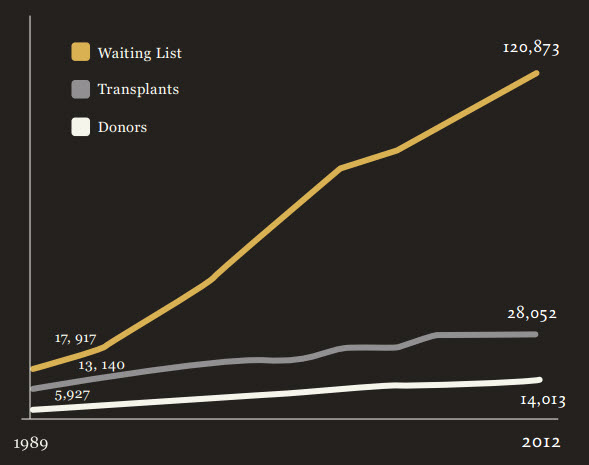Competing teams announced for $1 million prize incentive to create an artificial liver
September 16, 2014

The U.S. organ waiting list has grown rapidly, while the number of organ donors and available transplants has stagnated — but the true need for transplants is almost 10x larger than the waiting list suggests: 900,000 U.S. annual deaths could be prevented or significantly delayed by organ transplantation. (Credit: New Organ/Organ Procurement and Transplantation Network)
New Organ — a collective initiative for tissue engineering and regenerative medicine — announced today (Sept. 16) the initial six teams competing for the $1 million New Organ Liver Prize, a global prize competition launched in December 2013 and sponsored by the Methuselah Foundation, a biomedical charity.
The award will go to “the first team that creates a regenerative or bioengineered solution that keeps a large animal alive for 90 days without native liver function,” with a deadline of the end of 2018. Future challenge prizes will cover additional whole organs.
The six teams represent scientists* from Harvard Medical School, Massachusetts General Hospital, Northwick Park Institute for Medical Research, University College of London, University of Florida, University of Oxford, University of Pittsburgh, and Yokohama City University. More teams will be announced in the future.
“We need to make people as valuable as cars,” New Organ Founder and Methuselah CEO David Gobel told KurzweilAI. “Right now, there are no parts for people except from ‘junk yards’ from crash victims.” He said the choice of the liver makes sense because it’s “most likely to regenerate itself; it’s relatively homogenous; and it’s a key item in toxicity studies, extremely well characterized.
“This is an engineering problem. The more people who try, the more solutions.” Gobel mentioned vascularization (forming and maintaining blood vessels while preventing clotting) as a key problem (a solution for kidneys was mentioned on KurzweilAI last week).
“Regenerative medicine, with its promise of repairing damaged tissues and growing replacement tissues and whole organs, is the new frontier.” — 2020: A New Vision — A Future For Regenerative Medicine, U.S. Department Of Health And Human Services Report
New Organ has assembled a stellar team of 24 leading advisors, including Dr. Anthony Atala
Director, Wake Forest Institute for Regenerative Medicine (who headed that kidney study); Dr. Robert Langer, David H. Koch Institute, Professor, MIT; Dr. Sangeeta Bhatia, Dir., MIT Lab for Multiscale Regenerative Technologies; and Dr. Raymond Chung Dir. of Hepatology, Medicine Service, Mass General.
Methuselah Foundation is a biomedical charity working to extend healthy life by advancing tissue engineering and regenerative medicine. Methuselah has given more than $4 million to support R&D in regenerative technologies, including founding investments in Organovo, SENS Research Foundation, and Silverstone Solutions. It seeks to enable a world where 90-year-olds are as healthy as 50-year-olds by 2030.
* The prize teams are led by:
● Dr. Tahera Ansari (Team Hepavive): Pursuing the ‘decell-recell’ approach to bioengineering a liver.
● Dr. Stephen Badylak (Team Badylak): A pioneer in biologic scaffolds using extracellular matrix.
● Dr. Eric Lagasse (Team Ectogenesis): Grew mini-livers inside the lymph nodes of mice with liver disease.
● Dr. Bryon Petersen (Team Petersen): An authority on the role of hepatic stem cells in liver pathology.
● Dr. Takanori Takebe (Team Organ Creative): Created tiny ‘liver buds’ that grew and functioned in mice.
● Dr. Basak Uygun (Team HepaTx): First to report proof-of-principle transplantation of engineered liver grafts.